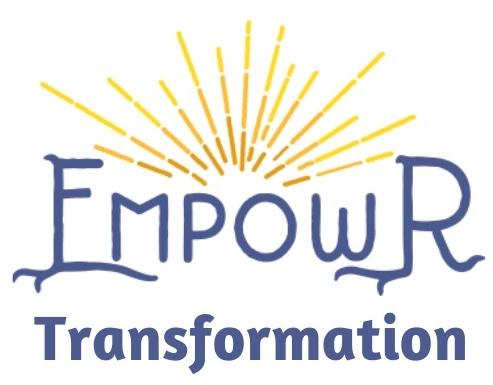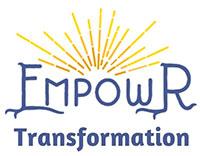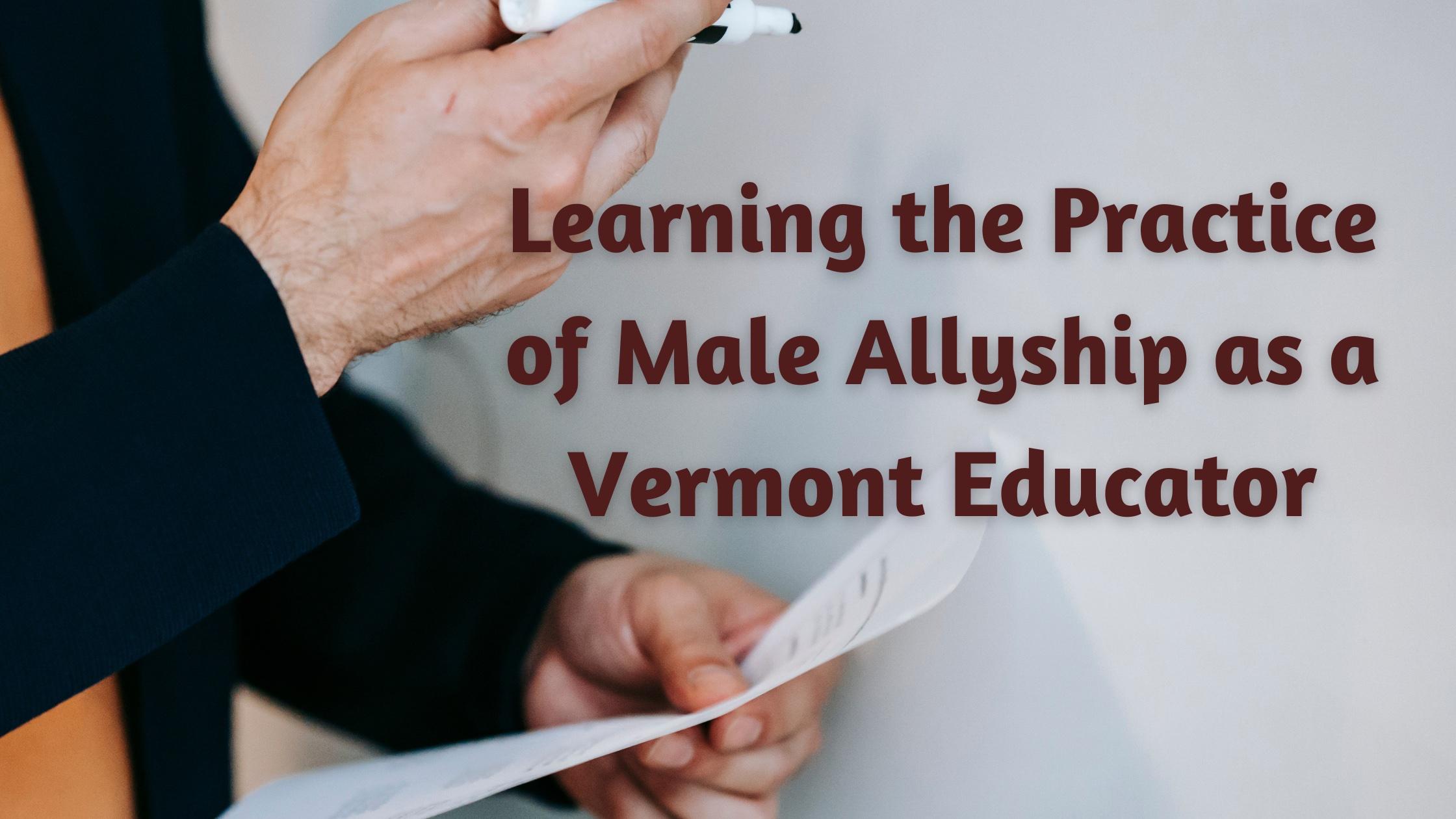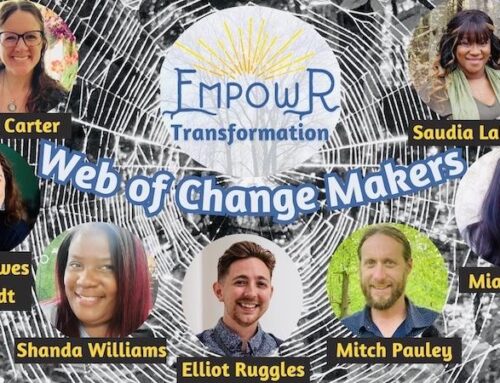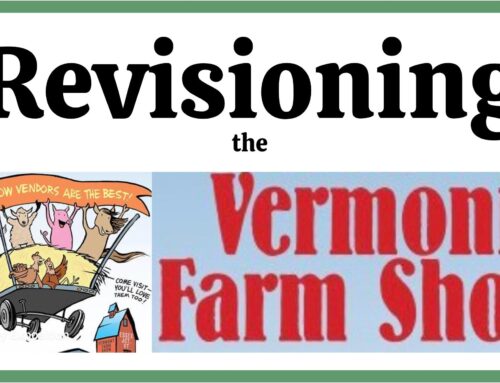Mitch Pauley, a Vermont educator and EmpowR Transformation facilitator, shares his personal story of learning the practice of male allyship at a Vermont high school and the varied impacts of speaking truth to power.
Growing up an only child and in a family culture that was driven by the fundamentalist Southern Baptist Church, I learned early on how to behave “like a man.” There were to be no tears, there was to be no questioning of authority or expressing opinions that would challenge the church or the patriarchal decision making structure of my family unit. I needed to fall in line, I had to suppress any emotion that may arise for whatever reason, I had to engage in “men like” activities and was told many times to even watch how I walked or ran, especially when playing sports. It was not okay, if at any point, I was perceived to be effeminate–my masculinity always needed to be present.
Over time as I got older, my parents eventually got divorced and they both were able to leave the church behind them and restart their own lives. While living with my dad during college, we were able to come together and hold many conversations about culture, society, and the impact that the suppression of the church had on both of us. My dad died ten years ago with a lot left unresolved between us. One thing we were able to come to an understanding on before he passed was that for most of our lives we did not know how to be in relationship with each other. We were unfamiliar with what it meant to truly listen to one another. We had varied abilities and perspectives about how to share emotional connection and vulnerability.
Since then I’ve been on a non-linear journey to explore what it means to be in supportive relationships. When my partner Rae was diagnosed with cancer five years ago, we dove into deep healing work–both individually and as a couple. As Rae’s healing journey expanded into the creation of EmpowR Transformation’s work to bridge personal healing, social justice, and building a culture of belonging, I began to learn how my own healing work positively impacts the world around me. As I began to understand and heal some of my deepest wounds, I found I was better able to be in relationships with people. As my self awareness grew around how to be accountable for the impacts of my words and actions, I began to be more open to understanding how the advantages I experience as a white, heterosexual, employed, able-bodied dude are set up to be in my favor at the detriment of many people who hold less dominant identities.* I started to unpack how I have influenced power dynamics in spaces with people with marginalized identities and what I can do differently. I began to understand this is some of the background work to learn the practice of male allyship.
Male allyship is active promotion of gender equality and equity in men’s personal lives and in the workplace through supportive and collaborative relationships and public acts of sponsorship and advocacy intended to drive systemic improvements to the organizational culture. (Harvard Business Review).
Male allyship is a cultural mindshift. It is not an event or an experience, but a practice of increasing self awareness, improving gender intelligence, and advocating for women (Forte).
Male allyship also expands beyond women and workplace to include people with gender expansive identities and to consider intersectionalities with other marginalized identities, especially race and ethnicity; and goes beyond the workplace and can be practiced in the home, in family dynamics, and in community and broader cultural context (EmpowR Transformation).
Practicing Allyship in a Vermont School
As an educator who worked in public schools for close to twenty years, I witnessed some of the very same characteristics of dominance that were imposed on me and my family by the church. For instance, the norm to never question authority is something very common in school administrations. I worked in five different school districts in Vermont and at every single one there was silence about issues that pertain to racism, sexism, ableism, and negative impacts on people with marginalized identities. While I was always uncomfortable with this injustice, it wasn’t until my experience working at U-32 in Montpelier, Vermont when I began to step into practicing male allyship.
In March of 2021, a Black woman from the West Coast moved to Vermont to join the faculty as a school social worker. She believed Vermont was a safe place for her to experience, based on how Vermont represents itself as a welcoming place. She was bold, powerful, and not afraid to call things out, especially what she recognized as toxic white supremacy culture and characteristics of explicit and implicit racism and bias. The students loved her. They felt safe confiding in her and they disclosed their lack of trust in the administration. She was one of two Black people working in a faculty of over 100 people. She raised awareness of the actions her white colleagues and superiors displayed that ranged from microaggressions and unconscious bias to overt racism. She was repeatedly gaslit and dismissed, and often excluded from collaborative opportunities with her department. Sadly, she was ultimately forced out of her position and moved back to the West Coast.
We shared similar beliefs about the importance of social emotional skills being necessary for learning which were unpopular among faculty committed to upholding the status quo. As we got to know each other, she offered wisdom and guidance about the depth of injustice at the school and I held safe space for her to process the racism she was experiencing. I began to use my voice to support her as an advocate for the issues she was raising. As I spoke up, I gained more courage to raise awareness about other inequities students were experiencing. COVID revealed class inequity challenges that were often hidden and I shifted my priorities as a special educator to meet students where they were at. As I called attention to the inequities and injustices these students were facing in the current rigid system and continued to lift up the work of my former colleague, I was met with resistance, denial, passive aggressive undermining of skills, and punitive measures.
I was formally reprimanded and placed on “corrective action,” for using my voice to further expose injustice, instead of hiding in the comfort of silence. I was at risk of not having my contract renewed at the end of the year and began looking for another job. I left public education and began work as a special educator at an alternative school that works with children with severe trauma histories that is centered in equitable practices. While it was terrifying to be punished for showing up as an ally (to my colleague and students), it also illuminated how toxic the education system is for People of Color and how important it is for people to believe their stories of injustice and for more people to speak truth to power. I wonder if there had been more of us practicing active allyship, my colleague would not have been traumatized and had to leave Vermont. If there were more of us practicing active allyship, maybe there would be less educators leaving their jobs.
Unlearning and Relearning
In my journey to heal from the wounds of patriarchy, to unlearn my own white supremacy and dominance, and to relearn more just ways of being and doing, I have come to understand this is a long game with no destination. Practicing allyship doesn’t just support people with marginalized identities, it also helps me to be a more loving and accepting human. I have learned that I can know and accept myself as a whole being, one who can embrace both masculine and feminine energies that comprise who I am. I have learned that although it can be a scary and challenging thing to stand up and speak out against oppressive systems, especially due to retaliation (particularly in the workplace), the potential for change is what I choose over staying silent and perpetuating oppressive systems. Even when I was close to losing my job, I stayed the course and trusted, and the next job presented itself–where I was actually hired for many of the things I was punished for.
Practicing allyship as a white man requires a lot of self awareness and personal growth. I am learning to accept feedback and accept being called into looking at behaviors I may exhibit that perpetuate characteristics of dominant culture. I am constantly working on how to unlearn defensiveness. My edge is to disengage from mansplaining (explaining myself as the one with the “right way” and being rigid around other ways of thinking and knowing.) I am working on taking responsibility for the impact of my behaviors when I become irritable, frustrated, and want to disassociate from a situation. Although hard at times, I see the changes and growth within myself that come each time I take responsibility for shifting behaviors that demonstrate dominance and I’m learning the best way to do this is to pause, sit with the discomfort without preparing a response, and lean into my growth edge.
I find that in my unlearning and relearning, I am able to draw from my experiences and begin to model behavior change out in the world and to talk about it with other men. This supports my allyship practice as I’m able to be more present and aware of the needs of people who experience inequities I am not as aware of because of the social advantages I hold. By building self awareness around how I respond in dominating ways, I can better recognize it in other men and can speak up in real life situations and interactions.
Part of my commitment to work taking place in social justice movements, especially within education, is that from my position of advantage, it is my responsibility to affect change within myself. By doing so, I build courage to release ego, to speak up when other men cause harm, to accept feedback when I cause harm, to step aside and let people with less privilege take up more space, and to lift up the work, ideas, and efforts of people who society gives less air time to because they aren’t white cis men. I also see myself as an ally to other men who are trying to step more into male allyship. Men need to be able to support each other and build community together so we can unlearn and relearn and be a part of changing dominant systems and cultural norms for equity and justice in the institutions where we work, the communities we live and play in, and our own homes and families.
I’ve been facilitating men’s community building events with EmpowR Transformation for a couple of years now and I am ready to step up my own allyship practice by offering a space for men to unlearn and relearn together so we can practice male allyship growth in community. I hope you will consider joining me (or sharing with the men in your life) in the new EmpowR Male Allyship Cohort: Step into Community Building.
*This language was changed from what was previously written “my identity as a white, cis-gendered straight man can cause unintentional harm” to be less elitist sounding thanks to some feedback we received on Facebook. Thank you. At EmpowR we are constantly navigating how to use language in ways that can reach people where they are at.
